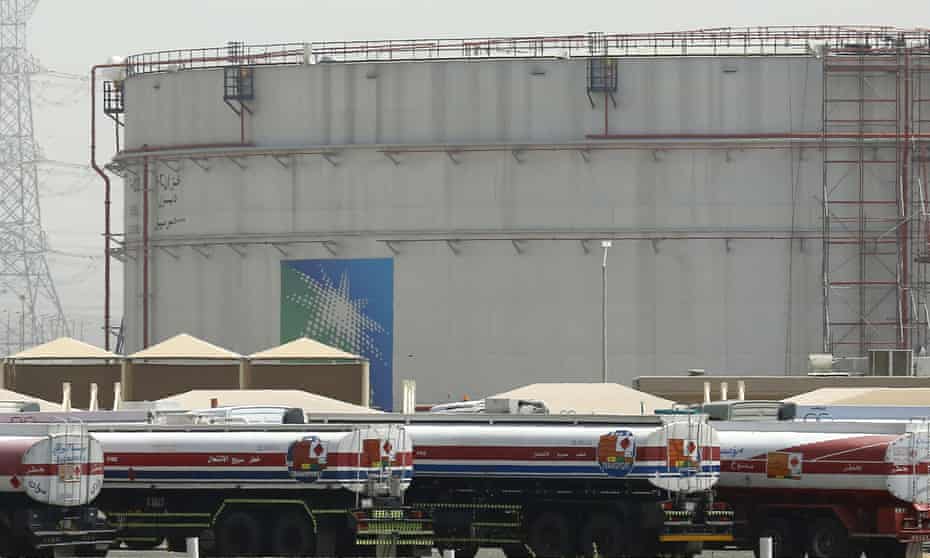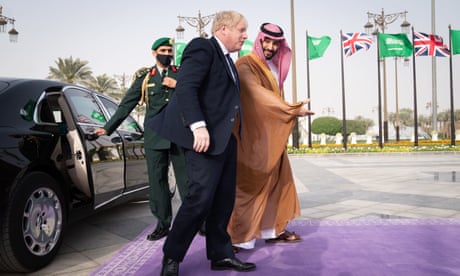Explainer: Boris Johnson has asked Saudi Arabia to pump more oil; what implications would this have?

Storage tanks and fuel trucks at an Aramco oil facility in Jeddah, Saudi Arabia. Photograph: Amr Nabil/AP
Bibi van der Zee
THE GUARDIAN
Why are Saudi Arabia and the United Arab Emirates being asked to pump more oil?
Western powers are looking for ways to keep the pressure on Russia during its invasion of Ukraine. Some countries have committed to phasing out Russian oil and gas, while others are still investigating ways of doing this. Saudi Arabia is one of a number of countries, along with Venezuela and Iran, that might be able to plug the gap in oil production.
How important is Saudi Arabia as an oil producer?
Saudi Arabia has an estimated 17% of the world’s proven petroleum reserves. Saudi Aramco, the state-owned company which handles Saudi oil, is the world’s largest oil exporter, and one of the world’s most profitable companies. In 2019, in an unexpected move, a tiny part of the company went public. It raised less than Crown Prince Mohammed bin Salman, the country’s ruler, had reportedly hoped for, but still brought in about $25bn. The UAE, meanwhile, holds the estimated seventh largest reserves in the world.

Boris Johnson upbeat on Saudi oil supply as kingdom executes three more
Are Saudi Arabia and the UAE going to open the taps to oblige the west?
Boris Johnson went to Riyadh to ask if the Saudis would consider increasing their output, but so far the answer appears to be no. He also approached the UAE. However, the relationship between Saudi Arabia and western countries has been fairly frosty in the aftermath of the killing of Saudi journalist Jamal Khashoggi in 2018. Relations with the UAE are not at their best either.
Meanwhile Riyadh has been coordinating oil supply levels with Moscow over the last few years, although that has also not been smooth. Saudi Arabia was reported on Thursday to be considering accepting the Chinese yuan in exchange for oil, rather than the traditional dollar.
Does Saudi Arabia have any plans to decarbonise? How realistic are they?
Prince Mohammed has said Saudi Arabia aims to achieve carbon neutrality by 2060, with initial investments of more than 700bn riyals ($187bn). They are investing heavily in renewables.
The Saudis often cite the circular carbon economy, in which CO2 is captured and then re-used, recycled or removed. Its deployment depends heavily on technologies that are still not commercially proven. In an interview with Time magazine, Saudi Arabia’s energy minister, Prince Abdulaziz bin Salman, said that although it would pump more oil, “we can become more efficient, by installing insulation for buildings, by having more efficient standards for industry, and so on. And we can take the CO2 that was committed to the atmosphere and use it in a valuable application, say for a food or beverage company, as a valuable product, so it becomes a material, instead of discarding it.”
Both countries are also members of the Middle East Green Initiative, a regional pact on climate change agreed last autumn.
If Saudi Arabia does decide to pump more oil, what will be the implications for the climate?
Dr Simon Evans of Carbon Brief says: “Ordinarily you’d say higher production means higher emissions, but the current situation is unusual. It’s at least possible that higher production from Saudi and others could allow Europe to cut purchases from Russia. And if Russia’s exports are geographically constrained (eg pipeline or lack of refinery capacity able to take Russian-grade crude elsewhere) or otherwise struggling to find buyers, then it could have to cut production. Quite a few big ifs there but it seems plausible/possible.”
Evans added that Saudi oil has lower upstream emissions than Russian oil.
Bibi van der Zee
THE GUARDIAN
Why are Saudi Arabia and the United Arab Emirates being asked to pump more oil?
Western powers are looking for ways to keep the pressure on Russia during its invasion of Ukraine. Some countries have committed to phasing out Russian oil and gas, while others are still investigating ways of doing this. Saudi Arabia is one of a number of countries, along with Venezuela and Iran, that might be able to plug the gap in oil production.
How important is Saudi Arabia as an oil producer?
Saudi Arabia has an estimated 17% of the world’s proven petroleum reserves. Saudi Aramco, the state-owned company which handles Saudi oil, is the world’s largest oil exporter, and one of the world’s most profitable companies. In 2019, in an unexpected move, a tiny part of the company went public. It raised less than Crown Prince Mohammed bin Salman, the country’s ruler, had reportedly hoped for, but still brought in about $25bn. The UAE, meanwhile, holds the estimated seventh largest reserves in the world.

Boris Johnson upbeat on Saudi oil supply as kingdom executes three more
Are Saudi Arabia and the UAE going to open the taps to oblige the west?
Boris Johnson went to Riyadh to ask if the Saudis would consider increasing their output, but so far the answer appears to be no. He also approached the UAE. However, the relationship between Saudi Arabia and western countries has been fairly frosty in the aftermath of the killing of Saudi journalist Jamal Khashoggi in 2018. Relations with the UAE are not at their best either.
Meanwhile Riyadh has been coordinating oil supply levels with Moscow over the last few years, although that has also not been smooth. Saudi Arabia was reported on Thursday to be considering accepting the Chinese yuan in exchange for oil, rather than the traditional dollar.
Does Saudi Arabia have any plans to decarbonise? How realistic are they?
Prince Mohammed has said Saudi Arabia aims to achieve carbon neutrality by 2060, with initial investments of more than 700bn riyals ($187bn). They are investing heavily in renewables.
The Saudis often cite the circular carbon economy, in which CO2 is captured and then re-used, recycled or removed. Its deployment depends heavily on technologies that are still not commercially proven. In an interview with Time magazine, Saudi Arabia’s energy minister, Prince Abdulaziz bin Salman, said that although it would pump more oil, “we can become more efficient, by installing insulation for buildings, by having more efficient standards for industry, and so on. And we can take the CO2 that was committed to the atmosphere and use it in a valuable application, say for a food or beverage company, as a valuable product, so it becomes a material, instead of discarding it.”
Both countries are also members of the Middle East Green Initiative, a regional pact on climate change agreed last autumn.
If Saudi Arabia does decide to pump more oil, what will be the implications for the climate?
Dr Simon Evans of Carbon Brief says: “Ordinarily you’d say higher production means higher emissions, but the current situation is unusual. It’s at least possible that higher production from Saudi and others could allow Europe to cut purchases from Russia. And if Russia’s exports are geographically constrained (eg pipeline or lack of refinery capacity able to take Russian-grade crude elsewhere) or otherwise struggling to find buyers, then it could have to cut production. Quite a few big ifs there but it seems plausible/possible.”
Evans added that Saudi oil has lower upstream emissions than Russian oil.
No comments:
Post a Comment